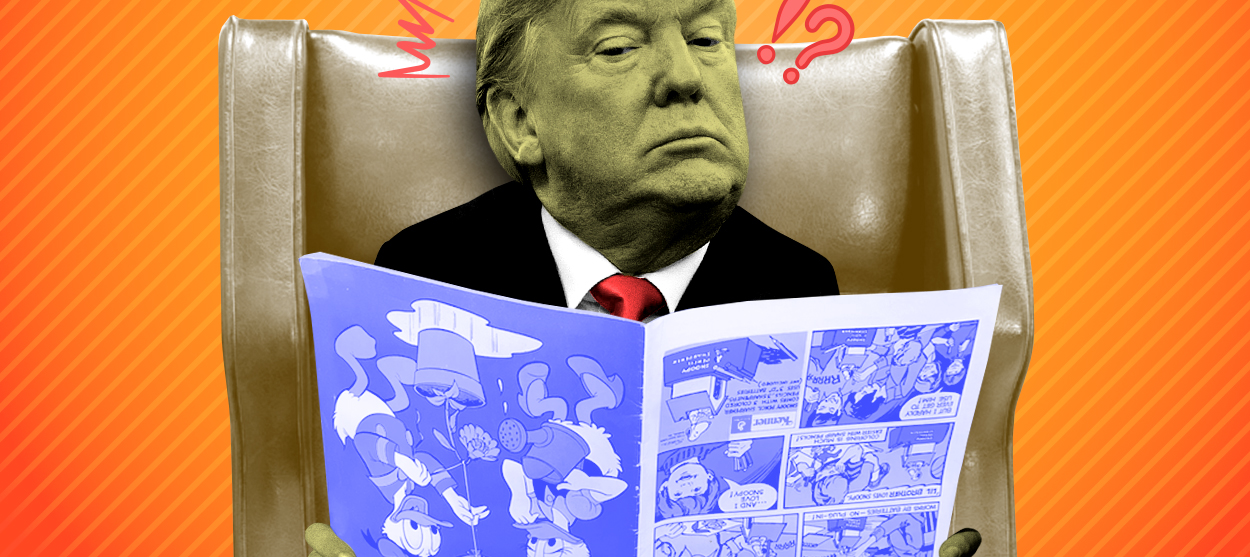Trump's lethal aversion to reading
The president's coronavirus response illustrates the perils of bibliophobia


A free daily email with the biggest news stories of the day – and the best features from TheWeek.com
You are now subscribed
Your newsletter sign-up was successful
If you're reading this sentence, you've read more than the president has today.
Last month, The Washington Post reported that President Trump ignored "more than a dozen" intelligence briefings in January and February warning him of the coronavirus. They were in the President's Daily Brief, which the president doesn't read.
White House trade adviser Peter Navarro wrote a memo in January warning of "a full-blown coronavirus outbreak on U.S. soil." Trump said he didn't see it because "Peter sends a lot of memos," none of which he reads.
The Week
Escape your echo chamber. Get the facts behind the news, plus analysis from multiple perspectives.

Sign up for The Week's Free Newsletters
From our morning news briefing to a weekly Good News Newsletter, get the best of The Week delivered directly to your inbox.
From our morning news briefing to a weekly Good News Newsletter, get the best of The Week delivered directly to your inbox.
After failing to read about the coronavirus, Trump failed to respond to it. It's not a stretch to say that if the president read, thousands of lives might have been saved.
Trump's ghostwriter for The Art of the Deal, Tony Schwartz, speculated that Trump has never read a single book in his adult life, not even a book about him or "by" him, of which there are 17. Trump pretends to have written more books than he pretends to have read.
In an interview on Crossfire in 1987, Trump mentioned Tom Wolfe as one of his favorite authors. Seconds after saying he had not read The Bonfire of the Vanities, Trump said, "I really like Tom Wolfe's last book," which was The Bonfire of the Vanities.
In 2015, Joe Scarborough asked Trump if he could read. After some awkward silence, according to Scarborough, "Trump quietly responded that he could while holding up a Bible."
A free daily email with the biggest news stories of the day – and the best features from TheWeek.com
When Megyn Kelly asked him about the last book he read, Trump replied, "I read passages. I read areas. I'll read chapters. I don't have the time." Trump didn't have time to read the last book he read.
Reading — even about oneself — requires focus, and Trump has none. "It's impossible to keep him focused on any topic, other than his own self-aggrandizement, for more than a few minutes," Schwartz said.
Trump's non-reading evinces not stupidity so much as incuriosity. Narcissists are easily bored, and Trump is no exception. In his 1990 book, Surviving at the Top, which he didn't write, Trump says that travel, exercise, and successful people bore him. "I get bored too easily," he says. "My attention span is short."
Trump's former National Economic Council director Gary Cohn allegedly wrote in an email, "Trump won't read anything — not one-page memos, not the brief policy papers; nothing. He gets up halfway through meetings with world leaders because he is bored."
The only information that interests Trump is information that affirms his self-image. He's rich, handsome, and popular — that's what he wants to hear, which is why he regularly says it himself.
Trump, we are told, processes information orally. If you process information orally, you likely process little information. And if you process little information, you exude even less. Every time Trump comments on a subject, he reveals how little he knows about it. He wondered aloud why the Civil War was fought. He said he's been treated worse than Abraham Lincoln, who was assassinated. He didn't know what happened at Pearl Harbor. He's too dumb to know he's ignorant, and he's too narcissistic to care.
As John McWhorter, a linguistics professor at Columbia University, observed, oral communication is personal, focuses on emotions, and "reinforces what you know," whereas the written word "collects information we don't memorize." The latter is conducive to prolonged thinking.
Trump, putative author of three books with "think" in the title, doesn't like to think. He doesn't even think about himself — his favorite subject — much less about public health. He lives and acts in the moment, chasing instant gratification, which reading does not provide. That's why he prefers television and Twitter to reading and thinking: they are immediate, visceral, and cognitively undemanding.
Reading doesn't necessarily make you a good president — James Buchanan, America's second-worst president, was well-read — but not reading is sure to make you a bad one. In his book Call Sign Chaos, former Secretary of Defense James Mattis writes, "If you haven't read hundreds of books, you are functionally illiterate, and you will be incompetent, because your personal experiences alone aren't broad enough to sustain you." Trump's personal experiences include being on TV a lot and watching a lot of TV.
One of the purposes of reading is to learn, but it's pointless to learn if you already know everything. Trump is convinced of his own omniscience. Last month, he claimed to "know a lot about helicopters" and to "know South Korea better than anybody," right before he got the population of Seoul wrong. "I know windmills very much," he said in December. "I've studied it better than anybody." The president has claimed to possess superior knowledge about drones, ISIS, courts, lawsuits, America's system of government, trade, renewable energy, banks, taxes, tax laws, debt, campaign finance, money, infrastructure, construction, technology, the economy, Democrats, polls, steelworkers, the word "apprentice," environmental impact statements, "the power of Facebook," "offense and defense," Sen. Cory Booker (D-N.J.), COVID-19, and "things."
None of this is true. Trump is a know-it-all who knows almost nothing and refuses to read anything except his own name. His bibliophobia would be funny if it weren't so deadly.
Want more essential commentary and analysis like this delivered straight to your inbox? Sign up for The Week's "Today's best articles" newsletter here.
Windsor Mann is the editor of The Quotable Hitchens: From Alcohol to Zionism.
-
 The year’s ‘it’ vegetable is a versatile, economical wonder
The year’s ‘it’ vegetable is a versatile, economical wonderthe week recommends How to think about thinking about cabbage
-
 Moltbook: The AI-only social network
Moltbook: The AI-only social networkFeature Bots interact on Moltbook like humans use Reddit
-
 Judge orders Washington slavery exhibit restored
Judge orders Washington slavery exhibit restoredSpeed Read The Trump administration took down displays about slavery at the President’s House Site in Philadelphia
-
 Kurt Olsen: Trump’s ‘Stop the Steal’ lawyer playing a major White House role
Kurt Olsen: Trump’s ‘Stop the Steal’ lawyer playing a major White House roleIn the Spotlight Olsen reportedly has access to significant U.S. intelligence
-
 Trump’s EPA kills legal basis for federal climate policy
Trump’s EPA kills legal basis for federal climate policySpeed Read The government’s authority to regulate several planet-warming pollutants has been repealed
-
 House votes to end Trump’s Canada tariffs
House votes to end Trump’s Canada tariffsSpeed Read Six Republicans joined with Democrats to repeal the president’s tariffs
-
 Bondi, Democrats clash over Epstein in hearing
Bondi, Democrats clash over Epstein in hearingSpeed Read Attorney General Pam Bondi ignored survivors of convicted sex offender Jeffrey Epstein and demanded that Democrats apologize to Trump
-
 Judge blocks Trump suit for Michigan voter rolls
Judge blocks Trump suit for Michigan voter rollsSpeed Read A Trump-appointed federal judge rejected the administration’s demand for voters’ personal data
-
 US to send 200 troops to Nigeria to train army
US to send 200 troops to Nigeria to train armySpeed Read Trump has accused the West African government of failing to protect Christians from terrorist attacks
-
 Grand jury rejects charging 6 Democrats for ‘orders’ video
Grand jury rejects charging 6 Democrats for ‘orders’ videoSpeed Read The jury refused to indict Democratic lawmakers for a video in which they urged military members to resist illegal orders
-
 Trump links funding to name on Penn Station
Trump links funding to name on Penn StationSpeed Read Trump “can restart the funding with a snap of his fingers,” a Schumer insider said
